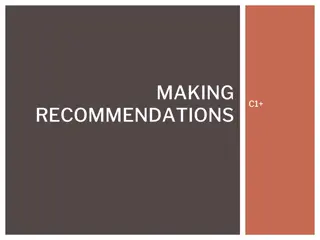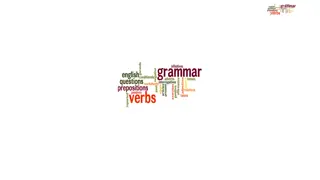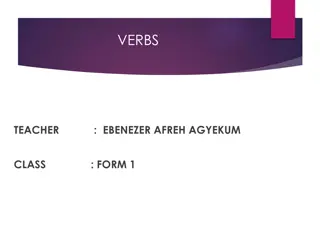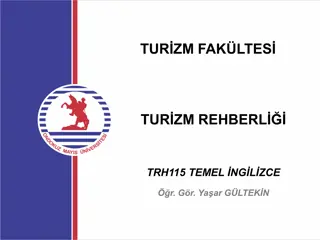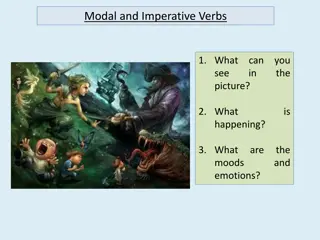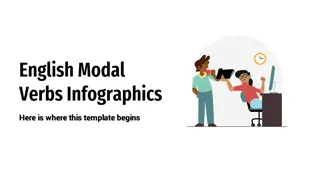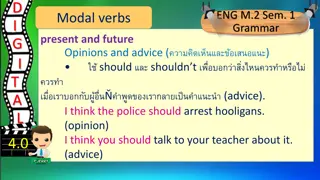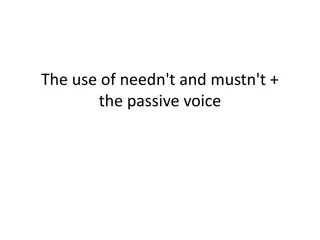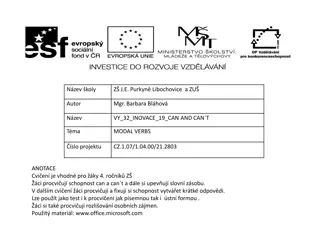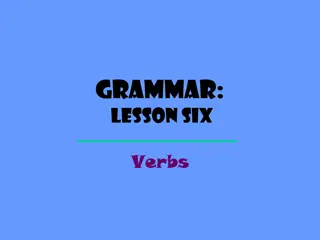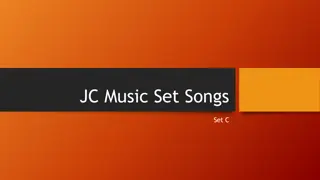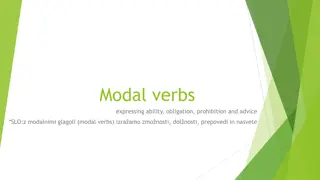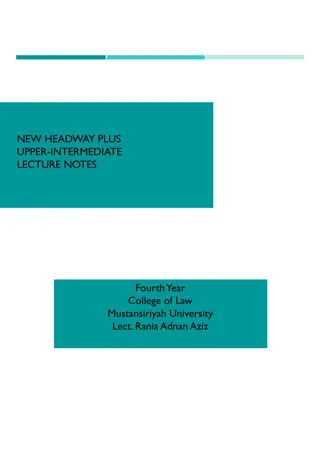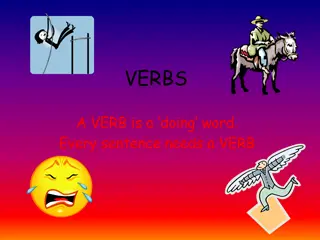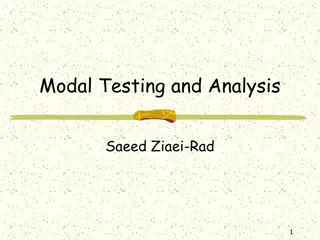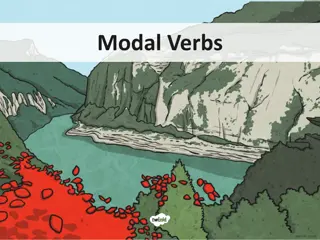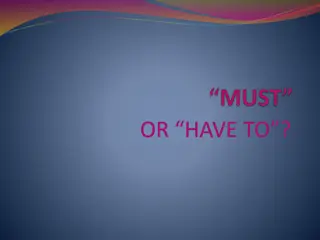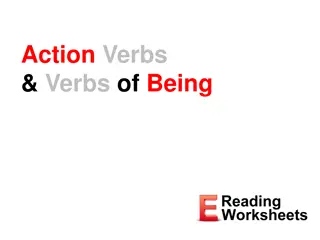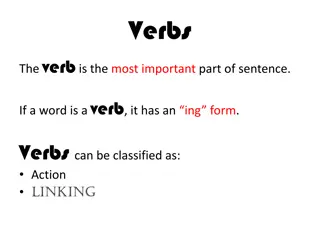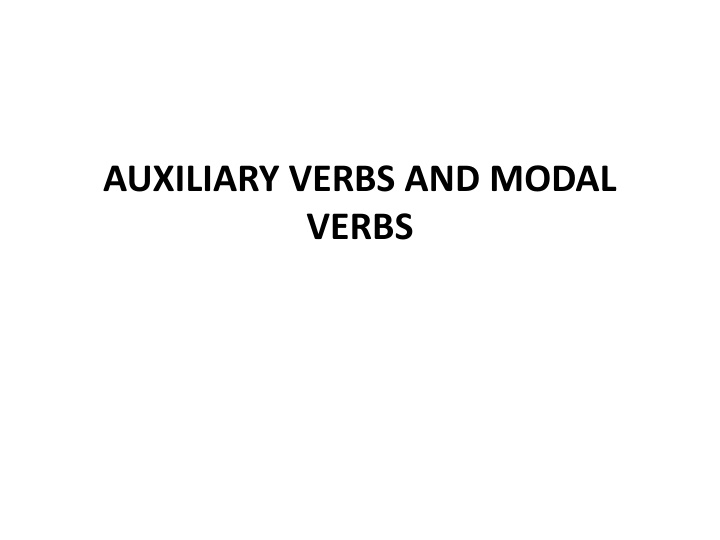
Mastering Auxiliary Verbs and Modal Verbs in French
Learn about auxiliary verbs in French, specifically the verbs "être" and "avoir," which are essential for conjugating verbs in compound past tenses. Explore examples and uses of "être" for expressing states of being, nationality, professions, and fixed expressions in various contexts.
Download Presentation

Please find below an Image/Link to download the presentation.
The content on the website is provided AS IS for your information and personal use only. It may not be sold, licensed, or shared on other websites without obtaining consent from the author. If you encounter any issues during the download, it is possible that the publisher has removed the file from their server.
You are allowed to download the files provided on this website for personal or commercial use, subject to the condition that they are used lawfully. All files are the property of their respective owners.
The content on the website is provided AS IS for your information and personal use only. It may not be sold, licensed, or shared on other websites without obtaining consent from the author.
E N D
Presentation Transcript
Auxiliary verbs in French language are helping verbs used in conjugating verbs in the compound past tenses. The two main auxiliary verbs are tre and avoir . These verbs can also be conjugated separately on their own. The verb tre which means to be is generally used to describe people, things, etc., in terms of their state, location and so on. The verb tre is used to
conjugate the compound past tenses of the 20 verbs generally referred to as verbs of movements. The verb also helps with the conjugation of the compound past tenses of all pronominal or reflexive verbs as well as all verbs used in the passive voice. But for the present study, we will be looking at the conjugation of these verbs in the present indicative tense.
Etre (to be) Je suis Tu es Il/Elle/On est Nous sommes Vous tes Ils/elles sont The verb tre is used to convey the state of being of the subject.
Exemples : Le gar on est intelligent. Je suis grande Tu es riche Vous tes malade Les oiseaux sont beaux Nous sommes courageux Mon fr re est content. Elle est triste Elle est la derni re-n e de la famille Les Fran ais sont blancs.
The verb etre is used for identifying nationality, profession or status and religious faith. Examples: Buhari est Nig rian. Sa femme est Nig rienne. Je suis chr tienne. Il est musulman Monsieur Melaye est s nateur Son oncle est banquier, mais il est infirmier. Tu es Br silien. Nous sommes Africains Vous tes croyante Je suis mari e.
The verb tre is used to form fixed expressions of life experiences, time and dates. Examples: C en est trop That s too much Ca y est! That s it. Etre de bonne humeur- to be in good mood Etre court d argent to be broke or short of money Etre de garde to be on call/on duty Etre de mauvaise humeur to be in bad mood Etre de retour to be back
Etre en retard- to be late Etre l heure to be punctual/to be on time Etre en bonne sant to be in good health Etre sain et sauf to be hale and hearty Elle est des n tres she is one of us/on our side. Nous sommes le 1er Octobre it is October 1st. Il en est he is ready to be involved. J y suis I understand/I get it.
The verb Avoir is used as a main verb (expressing possession), and it is also an auxiliary verb used in conjugating the compound past tenses of avoir itself and of other verbs. We will be looking at the conjugation of avoir in present indicative tense and the use in some sentences.
Avoir (to have) J ai Tu as Il/elle/on a Nous avons Vous avez Ils/elles ont
Avoir is used a main verb to indicate what is possessed, what is contained or what something consists of. Examples: J ai une maison Le professeur a beaucoup de livres J ai la cl de la chambre Vous avez un sac Tu as quel ge ?
Avoir is also used with some adjectives, nouns and adverbs to form idiomatic expressions of feelings, thoughts, sensations and sicknesses. Here are some of the expressions formed with avoir: Avoir besoin de to be in need of/to need Avoir chaud to be hot (a person) Avoir froid to be cold Avoir faim to be hungry Avoir soif- to be thirsty Avoir de l esprit to be witty Avoir de la chance to be lucky Avoir du courage to have courage/to be courageous
Avoir honte de to be ashamed of Avoir l air de to look/to seem . Avoir l habitude de to be used to Avoir l intention de to intend to Avoir envie to feel like, to long for, to desire Avoir raison to be right Avoir tort to be wrong Avoir sommeil to be sleepy Avoir peur de to be afraid of Avoir des crampes to have cramps Avoir une douleur to have pains Avoir une allergie de to have an allergy to
Avoir is also used in its third person singular to form the impersonal expression: il y a. This expression is commonly used to introduce a numerical quantity, meaning there is, or there are, or to convey information on a period of time or to express some worry about a situation.
Examples: Il y a deux tudiants dans la chambre There are two students in the room Je suis n e, il y a vingt ans I was born twenty years ago. Qu est-ce qu il y a, mon cher ami? What s wrong, my dear friend?
Semi-Auxiliary Verbs Aller is an irregular verb in French, it is an auxiliary verb for the futur proche (aller + infinitive). Its basic meaning is to go . It is conjugated in present indicative tense as follows: Aller Je vais Tu vas Il/elle/on va Nous allons Vous allez Ils/elles vont
Examples of sentences with Aller Je vais en classe Samuel et Jane vont en vacances. Emmanuella va l cole. Tu vas au march . Nous allons au travail. Vous allez la plage.
Examples with Aller in the futur proche: Je vais manger du riz I am going to eat some rice Je vais acheter des nouveaux livres. I am going to buy some new books
The verb Faire is also a semi-auxiliary verb. It basically means to do or to make , but it is often used in common expressions like weather-related expressions. The conjugation of the verb faire is also irregular. Faire Je fais Tu fais Il/elle/on fait Nous faisons Vous faites Ils/elles font
Examples : Je fais mes devoirs I am doing my assignments Il fait la lessive He is doing the washing Elle fait la vaisselle She is washing the dishes Nous faisons la cuisine We are cooking Vous faites le nettoyage You are doing the cleaning Tu fais les courses you are going shopping.
Other expressions with the verb faire are as follow: Faire la connaissance de to meet, make acquaintance of Faire un tour to go for a stroll Faire un voyage to take a trip Faire attention (a) to watch out for Faire de son mieux to do one s best Faire une promenade to take a walk/ride Faire des courses- to run errands Faire des progr s to make progress Faire du sport to practice/do sports Faire ses adieux to bid good-bye
Modal Verbs A modal verb is a verb that qualifies an action with regard to its desirability, its necessity, its possibility or its futurity. But as far as French linguistics is concerned, it is often said that French does not have modal verbs. But in recent years, and by assimilation with English and other languages, the expression verbes modaux is increasingly used in French.
French has less modal verbs than English. While English has will, may, shall, might, must, ought to, have to, can and be able to, French has three modal verbs: pouvoir, vouloir, devoir, to which can be added certain uses of savoir. However, these verbs have tenses that can modify their modality. French does not use modal verbs to denote futurity, as this is done by means of the future tense and other mechanisms. We will take a look at the conjugation of these verbs in present indicative tense and some examples where they have been used.
Pouvoir (to be able to/can) Je peux Tu peux Il/elle/on peut Nous pouvons Vous pouvez Ils/elles peuvent
Vouloir (to want) Je veux Tu veux Il/elle/on veut Nous voulons Vous voulez Ils/elles veulent
Devoir (to have to/must) Je dois Tu dois Il/elle/on doit Nous devons Vous devez Ils/elles doivent
Savoir (to know) Je sais Tu sais Il/elle/on sait Nous savons Vous savez Ils/elles savent
Pouvoir expresses ability, corresponding to the English can or be able to. In present tense, it implies a definite or potential ability. Examples: Je peux aller au cin ma ce soir.- I can go to the movies this evening. Nous pouvons aller au concert cette nuit. We can go to the concert this night. Les gar ons peuvent jouer au tennis. The boys can play tennis. Tu ne peux pas fumer ici. You cannot smoke here.
Vouloir is a verb expressing wish, desire or intention. In present tense, it implies a definite wish. Examples: Je veux de l argent. I want some money. Tu veux sortir maintenant. You want to go out now. Elle veut savoir la r ponse. She wants to know the answer. Vous voulez jouer au badminton samedi. You want to play badminton on Saturday.
Devoir expresses obligation. In present tense, it corresponds to the English must or have to . The verb can also mean to owe in English. Examples: Je dois partir midi. I must leave by midday. Vous devez arr ter le moteur maintenant. You must stop the engine now. Les enfants doivent aller l cole aujourd hui. The children have to go to school today Tu ne dois pas parler pendant l examen.- You are not supposed to talk during examination.
Savoir is sometimes used in French to express acquired ability instead of Pouvoir. Savoir implies to know a fact or to know how to. Examples: Ma s ur sait parler cinq langues.- My sister can (know how to) speak five languages. Tope sait la v rit . Tope knows the truth. Nous savons votre nom. We know your name. Vous savez conduire une voiture. You know how to drive a car.


